BGSU Herpetarium
Our Mission
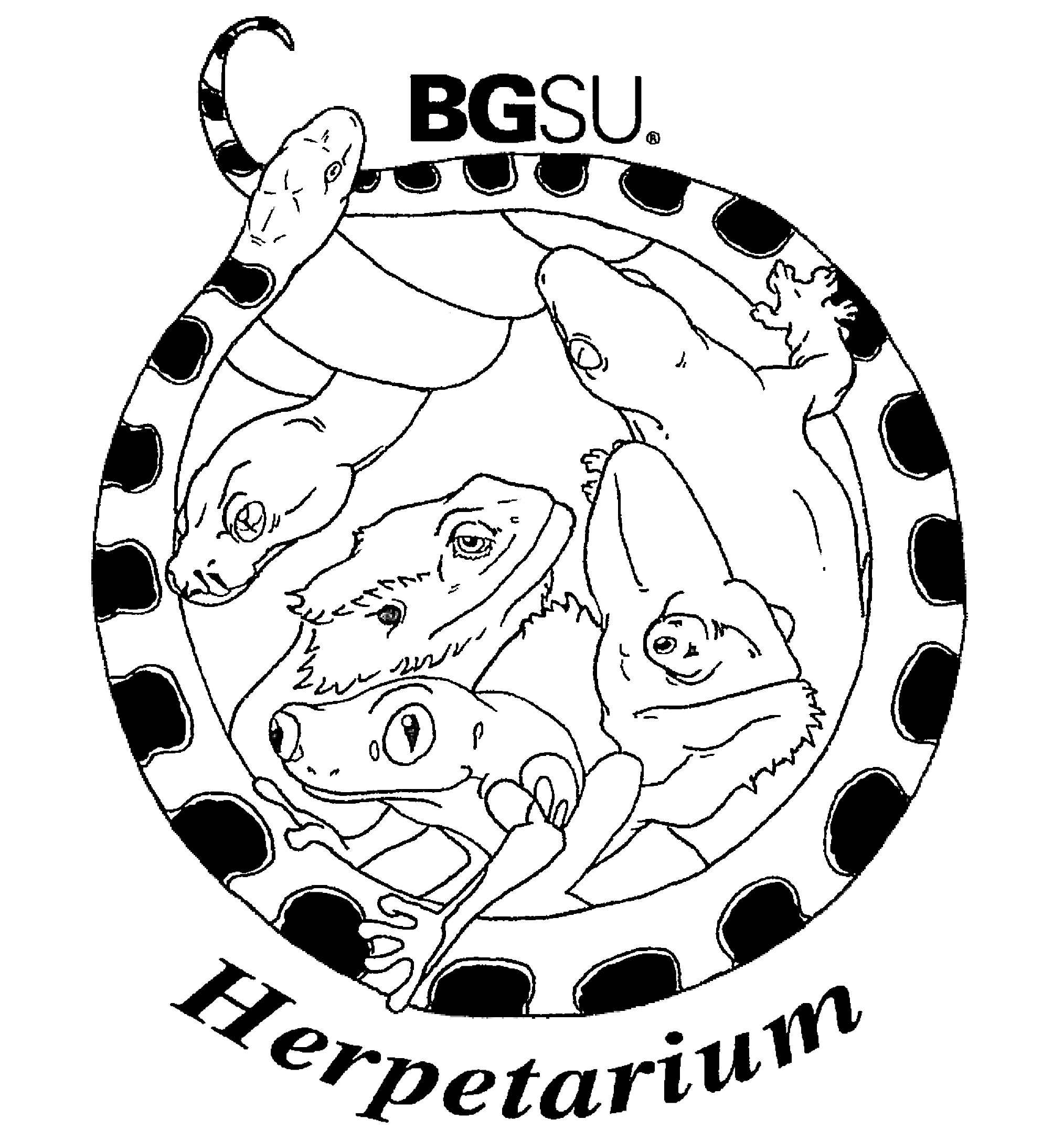 Welcome! Through outreach into the community and on the campus of Bowling Green State University (BGSU), the mission of the BGSU Herpetarium is to promote appreciation of biological diversity as well as the understanding and respect of organisms encountered through the field of Herpetology.
Welcome! Through outreach into the community and on the campus of Bowling Green State University (BGSU), the mission of the BGSU Herpetarium is to promote appreciation of biological diversity as well as the understanding and respect of organisms encountered through the field of Herpetology.
Volunteer work in the Herpetarium includes providing proper husbandry (care and feeding) for the animals, taking part in hands-on demonstrations and lectures, and to encourage respect for both the animals and visitors’ reactions to reptiles while educating.
Research utilizing proper reptile husbandry is encouraged in the same manner that all student-designed research is encouraged in the Department of Biological Sciences at BGSU. The Herpetarium is committed to the learning that comes from hands-on experience.
How It All Got Started
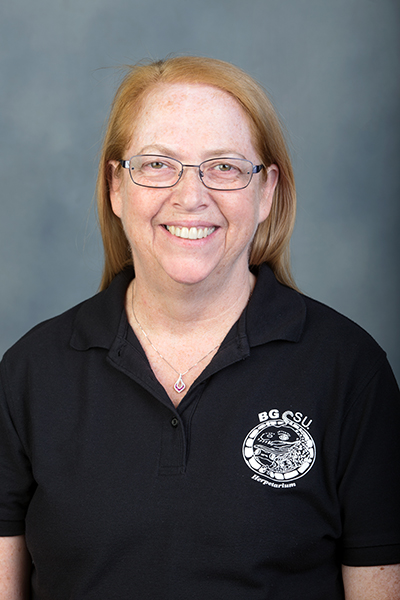
The Herpetarium was started by Dr. Eileen Underwood, professor emerita in Biology. After 25 years of genetic research with fruit flies, she made the decision to research life on a less microscopic level and started the BGSU Herpetarium in 1997 after keeping reptiles in her home.
The collection is used for educational demonstrations at local schools, the university, and for other local groups. Husbandry-related research is also conducted, with the best husbandry resulting in successful breeding. Most of the animals used in demonstrations are bred in the lab. The Herpetarium is run by student volunteers that feed, handle, and care for the lab residents.
Inside the Lab
Getting Involved
The animals in the BGSU Herpetarium are maintained by student volunteers. Volunteers are trained on proper reptile and amphibian husbandry and are responsible for the care and safety of their animals. Depending on the species, volunteer duties may range from feeding and cleaning to handling the animals on a daily basis. The Herpetarium ensures that animals are cared for in a manner that is healthiest for the species in a captive setting.
Students also have the unique opportunity to be involved in Herpetology demonstrations and tours. During these demonstrations, students learn how to handle and present the animals, offering a great hands-on experience in a public setting.
Volunteering in the Herpetarium is open to all class levels of students from any college of the University. If desired, students may receive 1-3 credit hours for their participation in the Herpetarium through BIOL 4530 (Amphibian and Reptile Husbandry) or 1 credit hour through BIOL 4540 (Bio Lab Tour).
If desired, students may receive 1-3 credit hours for their participation in the Herpetarium through BIOL 4530 (Amphibian and Reptile Husbandry) or 1 credit hour through BIOL 4540 (Bio Lab Tour). Their course descriptions are as follows:
BIOL 4530 – Amphibian and Reptile Husbandry
Fall, Summer, Spring. A Service Learning Course. Hands-on experience with reptiles and amphibians including basic husbandry and breeding. May include research aimed at optimizing captive husbandry. May be taken more than once, but only three credit hours may be applied toward major in biology. Three hours in lab per week for each credit hour earned. Prerequisite: consent of instructor.
BIOL 4540 – Bio Lab Tour
Fall, Summer, Spring. A Service Learning Course. Students will gain experience as an educator in a public biological setting by conducting lessons and presenting organisms in the various life science labs. May be taken more than once, but only three hours may be applied toward a major in biological sciences. Prerequisite: BIOL 3700, or BIOL 3430, or BIOL 4460, or BIOL 4760, or consent of instructor.
To become a lab coordinator, you must have experience working in the Herpetarium as a lab volunteer and go through the application process with Dr. Mason Murphy. Duties of the lab coordinators include training new volunteers, communicating the lab’s policies, ensuring that all animals are taken care of properly, and assisting with lab maintenance.
Current Lab Coordinators
Will Gyurgyik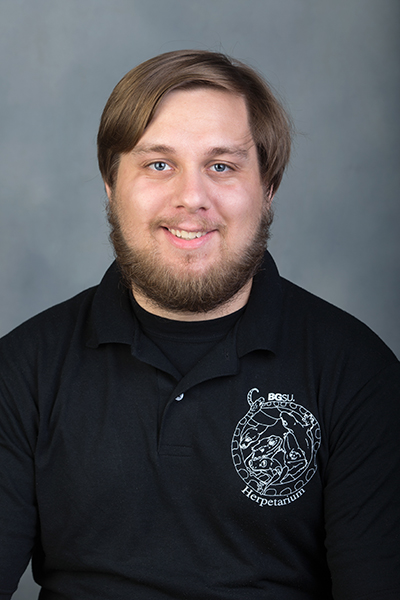
Will Gyurgyik is a senior pursuing his Bachelor’s degree in biology with a specialization in conservation biology and ecology, and he has been volunteering in the Herpetarium for three years. After graduation, Will plans to continue researching how burrowing reptiles interact with their substrate.
Katie Herzog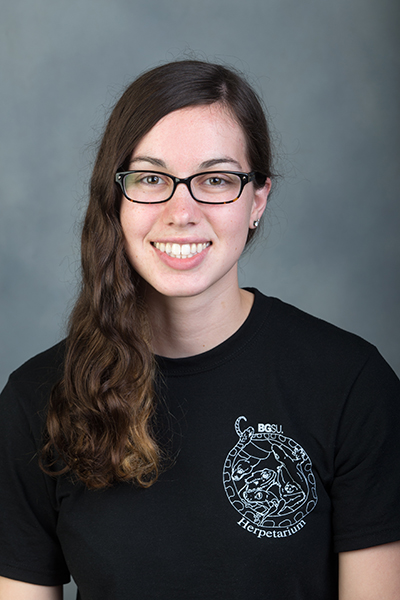
Katie Herzog is a second year biology major with a specialization in ecology and conservation biology, and she has been a volunteer in the Herpetarium for about one year. In the future, Katie plans to work in a zoo's herpetology department and travel throughout her career.
Dale Shank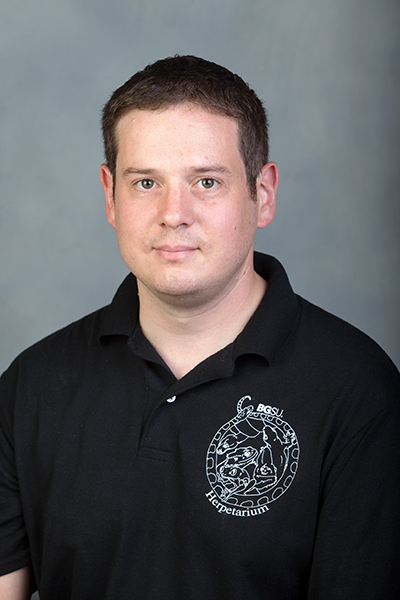
Dale Shank is a biology major with an interest in freshwater systems. He has been working in the Herpetarium since spring semester 2015, primarily taking care of snakes and Rhacodactylus geckos.
Students may also become demonstration coordinators where they will gain experience with public speaking at educational events for people of all ages. A demonstration coordinator will normally give a presentation of a set of animals from the Herpetarium, generally working from the smallest gecko to the largest snake. Coordinators are chosen from the volunteers by Dr. Underwood based on their experience and attitudes.
Current Demonstration Coordinators
Ashlee Haynes
Ashlee Haynes is a junior at BGSU studying inclusive early childhood education. She will be entering her fourth year of volunteering in the Herpetarium as of fall 2016.
These are just some of the ways to get involved at the BGSU Herpetarium. One of our favorite mottos is:
"Always remember to have fun, and take some time to handle your favorite animals!"

BGSU Herpetarium Resources
If you would like to become a volunteer, download and fill out the student volunteer form and a liability waiver form. Bring your paperwork to the Herpetarium in 111E Life Sciences.
View the Herpetarium manual for resources and quick guides on how to care for various animals in the lab.
In the News
Watch the Ohio Department of Transportation's video: Saving "ODOT"
The Herpetarium is a facility in the Department of Biological Sciences.
Bowling Green State University | Bowling Green, OH 43403-0001 | Contact BGSU Herpetarium | Campus Map
Updated: 09/26/2025 05:47PM





